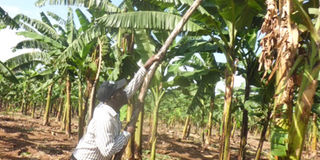Farmers to get disease-free banana hybrid varieties

A farmer tends to a banana garden. Photo by Lominda Afedraru
Bruce Benywanira, 50, of Kikunyu Village, Kabare parish, Rugaaga Sub-county in Isingiro District has 280 acres of matooke and employs about 50 people depending on the need, especially during weeding and planting seasons.
His take home every month is Shs40m. However, that amount could soon double if he embraces the new banana hybrid varieties that are pest-resistant.
Scientists at the National Agricultural Research Laboratories (NARL) in Kawanda and Tanzania are targeting black sigatoka disease which causes banana leaves to turn black and end up drying.
There is also fusarium wilt caused by soil borne fungus which enters the plant through the roots and colonises the vessels thereby blocking the flow of water and nutrients, leading to collapse of the plant and nematodes which destroys the roots and stems of banana plants.
Breeding process
The breeding is being implemented by scientists in Uganda and Tanzania where scientists in Uganda are breeding the East African highland banana (matooke) varieties and in Tanzania Mchare banana variety.
The head of the banana programme at NARL, Dr Jerome Kubiriba during the review meeting of the project in Kampala that the breeding is targeted at reducing the period for conventional banana breeding which initially used to take seven to eight years.
Impact
The project started three years ago and so far out of the several crosses done, using pollen from banana flower, 48 varieties are under testing with features of resisting the different banana diseases.
From the crosses made, scientists make banana seed which are planted for tissue shoot in the laboratory before transplanting them in the greenhouse and later in the field.
Dr Rony Swennen, the head breeder, explains that the main objective of this initiative is to speed up hybrid banana breeding in order to come up with varieties which can be accessed by farmers in time.
Science is making it easy because scientists are able to use a technology where they extract DNA of the plant during the breeding process to assess the level of disease infection and select plantlets that are disease free for further multiplication.
Impact
The project started three years ago and so far out of the several crosses done, using pollen from banana flower, 48 varieties are under testing with features of resisting the different banana diseases.
From the crosses made, scientists make banana seed which are planted for tissue shoot out in the laboratory before transplanting them in the greenhouse and later in the field.
Dr Rony Swennen the head breeder explaining that the main objective of this initiative is to speed up hybrid banana breeding in order to come up with varieties which can be accessed by farmers in time.
Science is making it easy because scientists are able to use a technology where they extract DNA of the plant during the breeding process to assess the level of disease infection and select plantlets that are disease free for further multiplication.
Spread
There are a number of pests and diseases infesting banana in farmer fields, namely banana bacterial wilt, nemdatodes, black sigatoka and fusarium wilt, among others. Such breeding initiatives are to come up with varieties which are resistant to diseases.
The crosses are done are from varieties like Nakitengo, Mchare and Nakabulu among others.
The director Naro, Dr Ambrose Agona says since banana is a major crop grown by farmers in Uganda, it is important for scientists to breed varieties which are disease free for farmers to benefit from.




